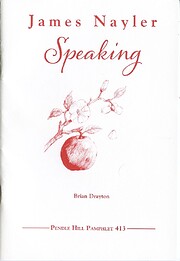

Click on a thumbnail to go to Google Books.
|
Loading... James Nayler speakingby Brian Drayton
 None No current Talk conversations about this book.  "To read James Naylor is to connect with Quakerism's initial eruption of insight and obedience," writes Brian Drayton, who has found, in the writings of this influential and controversial Friend, messages that speak to the turmoil of our times, as they spoke to the turmoil of 1650s England. Some central themes in the ministry of James Nayler are explored, with attention to how they address the most basic challenges of faithfulness and what early Friends called "The Lambs War". Through this exploration, Brian Drayton invites readers into a closer acquaintance and dialogue with the life and works of James Nayler. This pamphlet is an introduction to the writings, the voice, and the ideas of this powerful, resourceful, and disturbing Quaker founder, from the first generation of Quakers. The earliest Quaker preaching was a prophetic elaboration of the realization that Christ's spirit is present, active, and reliably knowable by all who seek it. By its nature, it contradicts many conventional values, offering a kind of freedom and power that can actually overcome evil, both inward and outward. This offer can be accepted by a unique spiritual method, epitomized (for Drayton) by the phrases "mind the Light" and "living in the Cross." (See Drayton's previous PHP #391.) The Quaker vision of humans, God, and their relationship was compelling in the 17th century, and it seems we modern Friends long for that compelling energy. But Naylor's writings, that Drayton summarizes, and his life also give us valuable teachings about how hard it is as well as how glorious, to live under the direct guidance of the spirit. We have become aware of the pitfalls and mazes for those who claim the spirit's guidance too easily. Discernment and faithfulness are necessary, and the life with the spirit has complexity. Naylor's life shows that the Light brings both disturbance and reassurance, both convictedness and consolation, trouble and healing. We may restrict our availability to both aspects of life with the spirit, for the sake of comfort, but thereby we are impoverished. A short biography of Naylor's life follows, 1618-1660. He was a Friend for about 8 years. no reviews | add a review
Belongs to Publisher SeriesPendle Hill Pamphlets (413)
"To read James Nayler is to connect with Quakerism's initial eruption of insight and obedience," writes Brian Drayton, who has found, in the writings of this influential and controversial Friend, messages that speak to the turmoil of our times, as they spoke to the turmoil of 1650s England. Some central themes in the ministry of James Nayler are explored, with attention to how they address the most basic challenges of faithfulness in what early Friends called "the Lamb's War." Through this exploration, Brian Drayton invites readers into a closer acquaintance and dialogue with the life and works of James Nayler. Discussion questions included. -- Back cover. No library descriptions found. |
Current DiscussionsNonePopular covers
 Google Books — Loading... Google Books — Loading...GenresMelvil Decimal System (DDC)289.641092Religion Christian denominations Other denominations and sects Quaker Europe British Isles -- Ireland & ScotlandLC ClassificationRatingAverage: (4.4) (4.4)
Is this you?Become a LibraryThing Author. |
||||||||||||||||||||||||||||||||||||||||||||||||||||||||||||||||||||||||||||||||||||||||||||||||||||||||||||||||||||||||